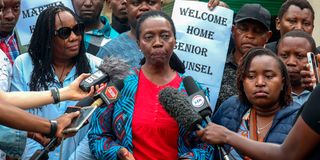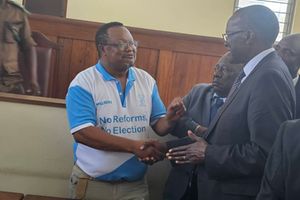
People's Liberation Party leader Martha Karua addresses the media at Jomo Kenyatta International Airport, Nairobi on arrival from Tanzania where she was denied entry on May 18, 2025.
As I slung my bag over my shoulder, preparing to be deported from Tanzania, the officer beside me leaned in and said something I haven’t stopped thinking about: “Don’t ever try something like this again,” he warned. “Even if we kill each other here, that is our business.”
He didn’t say it with anger. If anything, he looked like someone who had been on shift too long, a father with a kind face and a tired body, eager to get home. I expected some discomfort, maybe even a quiet apology for detaining us without explanation. Instead, I got that brutal declaration of isolationism, framed as national pride.
We had travelled to Tanzania to attend the court case mention of Tundu Lissu, the opposition figure facing treason charges for criticising the government. The six of us—Kenyan and Ugandan activists—including former Chief Justice Willy Mutunga and civil society leader Hussein Khalid, had hoped our presence would be a simple gesture of support. We were not carrying placards. We were not giving speeches. We just wanted to be there. But Tanzania didn’t let us in.
At 2am, we were denied entry at the airport. No official explanation. Just polite silence, long hours of waiting and a quiet instruction to leave. That same day, President Samia Suluhu gave a press statement, saying: “We’ve seen activists from other countries trying to interfere with our nation. They’ve already disrupted and damaged their own countries. Our country remains the only peaceful and secure nation in the region and I will not allow them to come here and destroy it.”
Political dissidents
That statement was not just chilling, it was telling. It confirmed what we already knew: our deportation wasn’t about security risks or protocol. It was about fear. The kind of fear that authoritarian regimes develop when ordinary citizens start paying too much attention.
What is happening in Tanzania deserves attention. The targeting of political dissidents is not new there. Mr Lissu, who survived an assassination attempt in 2017, has been repeatedly arrested, threatened and now charged with treason. In 2021, Freeman Mbowe, another opposition leader, was abducted and detained incommunicado for days before being charged with terrorism. Journalists have disappeared. Activists have fled into exile. Civil society space has shrunk. In such an environment, even silence becomes risky, and support becomes dangerous.
But this isn’t just about Tanzania. It’s about what kind of East Africa we are building or allowing to fall apart. And it’s also about what role solidarity plays in protecting democracy, especially in a region where the space for dissent is rapidly narrowing.
The truth is, no country has ever freed itself from repression without help, whether moral, political, or practical. The end of colonialism in Africa was not just the work of revolutionaries within national borders. It was also driven by cross-border alliances, diaspora organising, international media attention, and pan-Africanist pressure.
Apartheid in South Africa did not fall because South Africans alone willed it so. It fell because of coordinated resistance from inside and outside the country. Students in Soweto were backed by protests in London, sanctions from the United Nations, pressure from African governments, and mobilisations in the diaspora.
Solidarity is not interference. It is the backbone of African liberation. So when East African leaders begin to criminalise cross-border unity, when Martha Karua is deported from Tanzania just a day before us for trying to attend the same court case, but days later stands freely in Uganda to support opposition leader Kizza Besigye, we must ask ourselves: what exactly is the Tanzania government afraid of?
They are not afraid of foreigners. They are afraid of their own people seeing us stand in solidarity. They are afraid of Tanzanians waking up and realising they are not alone. That’s why President Suluhu didn’t just quietly block us, she went on national TV to warn that we were trying to “destroy” her country. Because the idea of connected, politically conscious citizens is more threatening than any foreign policy. But not all countries in the region are asleep.
Freedom
Kenya’s Constitution stands as our strongest defence, and not by accident, but because of the hard lessons learned over decades of struggle. Daniel Moi’s 24 years in power showed how unchecked authority can stall progress and serve only those in control, often at the expense of the people. When regimes become more about survival than service, they loot the nation’s resources to maintain their grip.
This distrust of power runs deep in Kenya’s history. From the Mau Mau fighters who resisted colonial rule, to the activists of the second liberation in the 1990s, to those who suffered through the post-election violence of 2007/2008, each generation has paid a heavy price for freedom. The 2010 Constitution reflects these sacrifices; it’s meant to prevent any leader from wielding unchecked power again. We hold tight to the safeguards built by those who came before us, knowing that real change requires constant vigilance
When Tanzanians are silenced, we see our own past and a warning about our future. That’s why Kenyans were quick to condemn our deportation. That’s why they spoke up for Lissu. That’s why we were there in the first place. Because East African repression is not just a Tanzanian problem. It’s regional. And it is spreading.
If Tanzania continues on this path of labelling dissent treason, of silencing critics, of calling solidarity interference, it risks becoming a land, where opposition politics is treated like war, and fear is embedded into daily life. The choice is clear. We either fight for the rights our forefathers bled for, or we lose them quietly, one border at a time.
I don’t regret trying to enter Tanzania. I would do it again. Because standing up for democracy, for human rights, for the freedom to speak and organise and live without fear, is not a crime. It’s our duty not just as citizens of our respective countries, but as Africans with a shared history and a common future. If the cost of solidarity is deportation, let it be. We cannot afford is silence.







